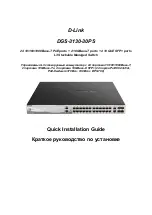
280
IGMP
IGMP Querier
IP
IPMC
IP Source Guard
L
LACP
LLC
IGMP is an acronym for Internet Group Management Protocol. It is a
communications protocol used to manage the membership of Internet Protocol
multicast groups. IGMP is used by IP hosts and adjacent multicast routers to
establish multicast group memberships. It is an integral part of the IP multicast
specification, like ICMP for unicast connections. IGMP can be used for online video
and gaming, and allows more efficient use of resources when supporting these uses.
A router sends IGMP Query messages onto a particular link. This router is called the
Querier.
IP is an acronym for Internet Protocol. It is a protocol used for communicating data
across an internet network.
IP is a "best effort" system, which means that no packet of information sent over is
assured to reach its destination in the same condition it was sent. Each device
connected to a Local Area Network (LAN) or Wide Area Network (WAN) is given an
Internet Protocol address, and this IP address is used to identify the device uniquely
among all other devices connected to the extended network.
The current version of the Internet protocol is IPv4, which has 32-bits Internet
Protocol addresses allowing for in excess of four billion unique addresses. This
number is reduced drastically by the practice of webmasters taking addresses in
large blocks, the bulk of which remain unused. There is a rather substantial
movement to adopt a new version of the Internet Protocol, IPv6, which would have
128-bits Internet Protocol addresses. This number can be represented roughly by a
three with thirty-nine zeroes after it. However, IPv4 is still the protocol of choice for
most of the Internet.
IPMC is an acronym for IP MultiCast
IP Source Guard is a secure feature used to restrict IP traffic on DHCP snooping
untrusted ports by filtering traffic based on the DHCP Snooping Table or manually
configured IP Source Bindings. It helps prevent IP spoofing attacks when a host tries
to spoof and use the IP address of another host.
LACP is an IEEE 802.3ad standard protocol. The Link Aggregation Control Protocol,
allows bundling several physical ports together to form a single logical port.
The IEEE 802.2 Logical Link Control (LLC) protocol provides a link mechanism for
upper layer protocols. It is the upper sub-layer of the Data Link Layer and provides
multiplexing mechanisms that make it possible for several network protocols (IP, IPX)
to coexist within a multipoint network. LLC header consists of 1 byte DSAP
(Destination Service Access Point), 1 byte SSAP (Source Service Access Point), 1 or 2
bytes Control field followed by LLC information.









































